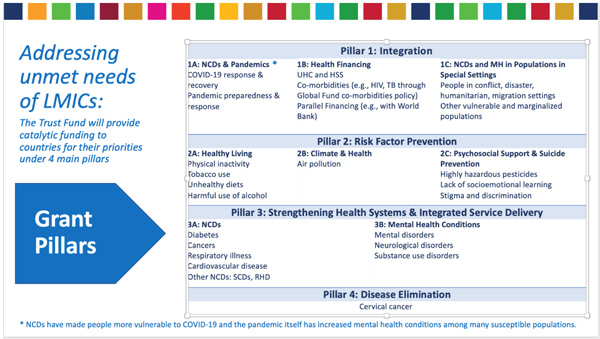World Health Organization
New global commitment to primary health care for all at Astana conference
24 Oct 2018
Ncd alliance | 19 Feb 2024
A new fund developed to spur investment in noncommunicable diseases (NCDs), including mental health, puts the countries hardest hit by inaction and lack of investment in the diseases at the heart of decision-making.
(Click here for article voiceover)
The Health4Life Fund aims to generate US$250 million over five years, which will then catalyse further investment in low- and middle-income countries’ priority areas to fight NCDs and mental health.
NCDs and mental health are the leading cause of death and disability worldwide, with NCDs accounting for 74% of all deaths and more than three out of four years lived with a disability. Each year, 17 million people die from a NCD before age 70. Of all NCD deaths, 77% are in low- and middle-income countries.
The fund, whose full name is the United Nations Multi-Partner Trust Fund to Catalyze Country Action for NCDs and Mental Health, is being led by WHO, UNICEF, UNDP and the Secretariat of the UN Inter-Agency Task Force on NCDs. The United Nations Multi-Partner Trust Fund Office is the administrative agent responsible for the grant-making process.

“There has been considerable reluctance by development partners to support low- and middle- income countries to tackle NCDs and mental health conditions despite repeated calls from these countries for catalytic assistance. And that is why the three founding partners are all from the global South — Kenya, Thailand and Uruguay. They are all members of the Fund’s governing body.”
Health4Life received a number of commitments at the recent 77th session of the UN General Assembly. Unexia, which is developing a blockchain infrastructure for global health, committed US$50 million and Soroptimists International Africa Federation announced it would join the Fund’s partners to advocate and raise funds specifically for the elimination of cervical cancer.
Health4Life has four main pillars: 1. Integration, 2. Risk factor prevention, 3. Strengthening health systems and integrated service delivery, 4. Disease elimination. It’s expected that most of the Fund’s grants will range from US$250,000 to US$3 million over three years.
Also at the General Assembly, the Aspen Global Innovators Group committed to fundraise US$5 million over the next three years.
"Aspen is not only dedicated to addressing NCDs and mental health but is committed to the Fund’s approach", said Douglas Webb, UNDP’s Manager for Health and Innovative Financing, who leads the agency’s work on NCDs and is part of Health4Life’s Core Team. “It turns the whole global health financing dynamic on its head because usually a lot of governance room is made for high-income countries with low- and middle-income countries given very little real decision making power… The Fund’s inclusive and participatory approach towards global health financing is an important basis for the partnership with Aspen.”
While philanthropists and donors are being encouraged to resource the Fund, Rory Nefdt, UNICEF’s Head of Child and Community Health, who is leading the development of the agency’s nascent NCDs portfolio, says the Trust Fund’s resources are being used to catalyse domestic funding and action: “There is consensus that at the end of the day countries themselves have to create sustainable systems to respond to their needs, that countries will need to mobilize the resources they need to fully resource their health systems.”
Invest to Protect was the theme of the NCD Alliance Global Week for Action on NCDs, in September 2022. Among its messages: every US$1 invested in fighting NCDs will generate US$19 in returns.
Asked why create an entirely new fund instead of building on an existing mechanism, Mamka Anyona, Health4Life Fund’s Policy and Strategy Lead, says that “historically and enduringly NCDs have been a disproportionately under-invested area of health. NCDs receive between one and two percent of global health funding; mental health even less. There is evidence that donor priorities influence country resource allocation, especially in countries whose health systems are heavily donor-dependent, and therefore the lack of global health momentum behind NCDs and mental health is reflected in inadequate country responses in spite of the very significant disease burden.”
“If the Global Fund comes to give you money for HIV/AIDS and malaria, then you’re going to make sure that you have a department of HIV, that you have a department of malaria,” adds Dr. Anyona. “You’re going to have staff there, you’re going to provide the matched funding that is a condition of Global Fund financing… When all that happens, a smaller proportion of a country’s limited health resources are left for NCDs and mental health, in spite of their relative importance in the country.”